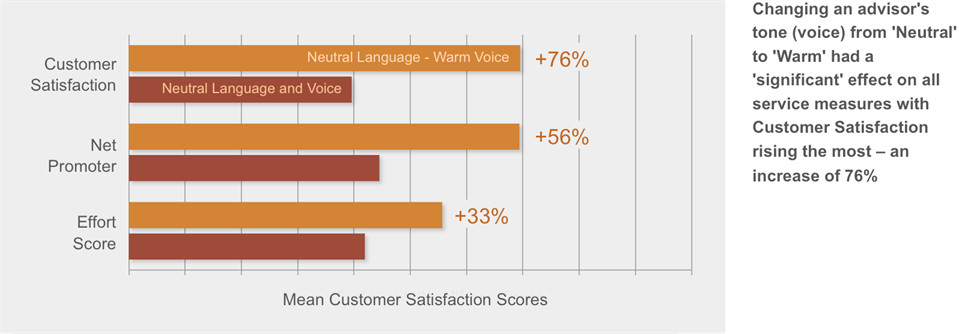Does an Advisor’s tone really matter?
When industry analysts ContactBabel polled Contact Centre Managers on what makes customers satisfied, ‘friendly and polite advisors’ came second only to first call resolution. Managers certainly think that an advisor’s tone is very important. But, does it matter to customers? And, what effect does it really have on satisfaction scores?
What does ‘tone’ really mean?
Tone of voice is ‘how you sound’. It’s the message that tells the listener about your personality as well as your attitudes and emotions. So it can let someone know whether you’re warm or cold, helpful or obstructive, confident or nervous. It’s present in every conversation and is conveyed through both the words you use and how you say them.
Our research
Working with our consultant psychologist we set out to shed some light on how much an advisor’s tone affects service scores. We took a real service call to a mobile phone company (about getting a replacement sim) and recorded two versions. The first had the advisor sounding neutral. The second had the advisor sounding positive and warm. In this test we wanted just to look at how ‘the way words were said’ changed service scores. So, the words within both calls were exactly the same and only the way that they were said was changed.
Then we asked a panel of 200+ consumers to score both the calls using some common service measures including Customer Satisfaction, Net Promoter Score and Customer Effort.
We also set up an experiment to find out what happens when the advisor used warmer language too, you can read about the results of that study here.
Changing the advisor’s tone with voice made a big difference to service scores

Figure 1: The effect of ‘the way words were said’ on service scores (higher scores are better)
The results took us a bit by surprise. Only altering the way words were said ‘significantly’ improved all of the service scores with Customer Satisfaction climbing by 76%.
Customer Effort was the measure that showed the lowest improvement at around 33%, but this was still significant. The reason for this smaller increase might be that ‘effort’ is more of a ‘rational’ (e.g. how long did the call take, did the caller get what they asked for etc.) concept rather than an ’emotional’ one.
In this test we kept it very simple with a neutral tone and something positive and warm.
However, in our tone of voice training and consulting we talk more about what tones of voice have the most impact on service scores. And, what the traits of these tones are. If you’d like to know more about what tones are likely to cut and boost your service scores, and what goes into them, just get in touch.
How to Mind Your Tone – 3 steps
Our research shows that advisor tone of voice is very important and that managers are right to put it towards the top of their list of things that satisfy customers. So how can tone get the attention it deserves?
Here are some things that I think should be looked at to improve advisors’ tone and make the most of this very real opportunity to improve service scores:
1. Recruitment – Research showed Southwest Airlines that one of the things that customers wanted the most was simply warm and friendly service staff. They went away and ‘recruited for smiles’. Now they have some of the highest NPS scores of any business – not bad for a ‘budget’ airline. Take a look at how you assess candidates and see what importance you attach to a good tone.
2. Training – Invest time in training not only for advisors, but for team leaders, managers, coaches and for those scoring calls too. Also, take a look at the scripts you use and see if they’ve been written with a smile in mind.
3. Management – What gets measured gets managed. Work with your quality and MI teams to find out if advisor tone of voice is a reliable predictor of what customer’s think of your service. And, begin measuring and managing it like any other KPI.
Feel free to get in touch if you want to know more about our tone of voice research, consulting or training.


